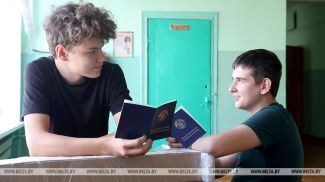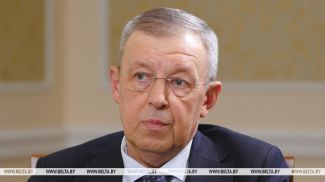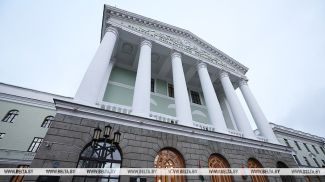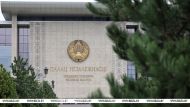The EcooM think tank, in collaboration with the Ukrainian Policy Foundation, has conducted a public opinion poll “Social thinking and media systems”. The survey was commissioned by the ONT TV channel and was carried out from 5 to 21 July. Pollsters interviewed 1,890 respondents in 126 localities across all regions of Belarus sampling the Belarusian population older than 18 by gender, age, level of education, type of settlement and region. Director of the EcooM think tank Sergei Musiyenko commented on the results of the survey in an interview with BelTA.
Respondents were asked to assess the actions of the government, the opposition (old and new) over the past year on a scale from 1 to 10. As a result, the government scored 6.69 points, the old opposition - 1.78, the new opposition - 1.47.
"This result is very revealing. People remember that the old opposition had some kind of a program, had leaders. Meanwhile, the new opposition is not known for such things. Very often such assessments were given even by opposition-minded people, as was evident from their answers in a questionnaire. At all times and in any country there is such a category of people who are against the government. But is the Belarusian opposition deserving of anything higher than zero (although the scale was from 1 to 10)? Is it because they speak the Belarusian language? Or because they have come up with some novel concepts for the country and people? We have not heard about them. The old opposition is like a fading memory. Indeed people remember that there were some people who wanted to do good for the country. The memory myth... They wanted to do something but they didn't. Probably they were not blessed with the country and the people? Meanwhile, the government makes things happen: stores and hospitals are working, there are no lockdowns and curfews,” Sergei Musiyenko said. “In my opinion, the government should have scored higher. It works well and could afford some self-promotion. But when you have real things to do and real things to worry about, there is no time for anything else. The only thing the new opposition does is self-promotion. It does not have to save people from COVID, to buy vaccines. All they do is putting pressure."
Sergei Musiyenko emphasized that after the recent events, the opposition's rating may have dropped. “This question was asked before a pompous trip of one woman to the United States. It would be interesting to see how the figures changed after that. Although the figure is already low. You know, it feels different though - like getting crumbs from the master's table. There is one more thing about it. If you are invited to someone's home and are not even offered food or drinks, will your attitude to this invitation change? Or were you not really invited? What is behind this? I talked to diplomats, people who know the protocol. They gave such an unexpected assessment. The U.S. president was advised to give a handout so that he would not be accused of having an official meeting with someone unrecognized. They wanted outside observers to think of it as of an action, not an official meeting. Just imagine diplomats and country leaders who are given some snacks from the table at an official meeting – this is an insult to the country and its delegation. This is how it is seen in the etiquette. This was done to downplay the level of the meeting. After all, there are many unrecognized territories and ‘traveling' personalities looking for recognition. She and those people from the opposition who advertised it as a success simply did not understand it. This situation has such a flip-side and it is implicit. Such a message was sent using the protocol. For hundreds of years politics has been built on such subtle things. Moreover, the official in charge of Belarus in the Department of State will be replaced by a competent and tough person who will ask what has been done, will take stock of the progress,” the analyst said.
As for the trust in the Belarusian opposition, the data of the July poll was compared with the data obtained during the February poll ordered by BelTA. In February 3.8% of people showed trust in the Belarusian opposition vs only 2.8% in July. In February 13.4% of those polled said they had ‘a fair amount of trust' in the opposition vs 7.6% in July. The share of people who said they had ‘not very much trust' was 25.2% in February, down to 24.3% in July. At the same time, 41.6% of respondents said they did not trust the Belarusian opposition at all. In February this figure was 38.2%. The number of people who were undecided on this matter is 23.7% now and was 19.4% in February.
“The number of ‘trust' and ‘have a fair amount of trust' responses has almost halved. This is the result of the opposition's work over the past six months. The ‘have not very much trust' answers have practically remained the same. The ‘do not trust' figures have slightly moved up. The overall 66% of respondents answered ‘do not trust' and ‘have not very much trust'. The percentage of those who found it difficult to answer also remained the same. Over the past six months the people's trust in the opposition went down by half. The opposition's calls and actions have driven people away,” said Sergei Musiyenko.
As to the question whether the old opposition and the new opposition have a future and clear programs, 0.4% of respondents said “yes” in respect to the old Belarusian opposition and 0.8% in respect to the new one. 5% and 1.4% gave ‘rather yes' answers respectively. 21.7% and 17.6% answered ‘rather no' and 31% and 37.9% - ‘no'.
“It is difficult from the sociological point of view to understand what the old and new opposition is. A year ago some new faces emerged wanting to replace the old ones. This is what people see. This is not an expert opinion. This is the people's opinion. People also have a clear understanding that neither the old opposition nor the new one have any prospects or any good program. The ‘don't know' answer was provided by 41,9% of respondents. The new opposition scored almost the same, 42.3%. Some 40% of people who easily answer some understandable questions do not know what to say about the program and the future of the opposition. It is because they see neither any program nor prospects for the opposition. That speaks a lot. There is actually a feeling that the more TV channels show the so-called new opposition and their statements, the lower its rating drops. Now only 2% of respondents say they know something about the opposition's program and believe they have a future. These people simply do not understand what they are talking about. There is no program, hence there is no future. Nothing at all. This is the reality,” Sergei Musiyenko said.













